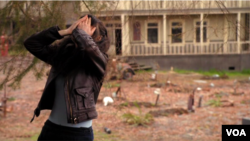Imagine getting an email that said you were accepted at your first-choice college, only to be told an hour later the acceptance was ... a mistake.
Ouch.
That’s what happened to nearly 300 applicants to Columbia University’s Mailman School of Public Health last week.
The emails said the New York City college was “delighted to welcome” the 277 applicants to its graduate program in public health.
But less than one hour later, the applicants received another email saying the acceptance emails were wrong.
(Did we say "ouch?")
Julie Kornfeld is the Mailman School’s vice dean for education. She apologized for the mistake and said the school is working to make sure “this mistake does not happen in the future.”
Kornfeld said the school regrets the “stress and confusion caused by this mistake.”
This is not the first time a college has sent out “acceptance” notices by mistake.
Last year, the State University of New York at Buffalo emailed 5,000 mistaken acceptance notices, the Buffalo News reported. The school quickly corrected the information and told the applicants they were still being considered for admission, but that no final decision had been made.
Time magazine keeps a list of colleges that mistakenly tell students they were accepted.
In 2014, Johns Hopkins University in Baltimore sent out acceptance notices to 300 applicants, Time reported, which came at great surprise. Earlier, the students were told their applications had been rejected.
The university quickly sent out another notice saying, regrettably, that first rejection letter was correct.
Anna Ivey is a college admission adviser and a former admissions officer. She said admission officials “live in fear” of making a mistake on something as important as admission to a student's dream school.
But college admissions requires “enough human data entry” to produce mistakes, Ivey said.
Such mistakes are unusual, happening maybe 1 percent of the time, Ivey said, but, “It's a 100 percent failure rate for that applicant who gets the wrong letter.”
How would you feel if this happened to you? Please leave a comment here, and visit us on Facebook, Twitter, Instagram and LinkedIn, thanks!
Ouch.
That’s what happened to nearly 300 applicants to Columbia University’s Mailman School of Public Health last week.
The emails said the New York City college was “delighted to welcome” the 277 applicants to its graduate program in public health.
But less than one hour later, the applicants received another email saying the acceptance emails were wrong.
(Did we say "ouch?")
Julie Kornfeld is the Mailman School’s vice dean for education. She apologized for the mistake and said the school is working to make sure “this mistake does not happen in the future.”
Kornfeld said the school regrets the “stress and confusion caused by this mistake.”
This is not the first time a college has sent out “acceptance” notices by mistake.
Last year, the State University of New York at Buffalo emailed 5,000 mistaken acceptance notices, the Buffalo News reported. The school quickly corrected the information and told the applicants they were still being considered for admission, but that no final decision had been made.
Time magazine keeps a list of colleges that mistakenly tell students they were accepted.
In 2014, Johns Hopkins University in Baltimore sent out acceptance notices to 300 applicants, Time reported, which came at great surprise. Earlier, the students were told their applications had been rejected.
The university quickly sent out another notice saying, regrettably, that first rejection letter was correct.
Anna Ivey is a college admission adviser and a former admissions officer. She said admission officials “live in fear” of making a mistake on something as important as admission to a student's dream school.
But college admissions requires “enough human data entry” to produce mistakes, Ivey said.
Such mistakes are unusual, happening maybe 1 percent of the time, Ivey said, but, “It's a 100 percent failure rate for that applicant who gets the wrong letter.”
How would you feel if this happened to you? Please leave a comment here, and visit us on Facebook, Twitter, Instagram and LinkedIn, thanks!




